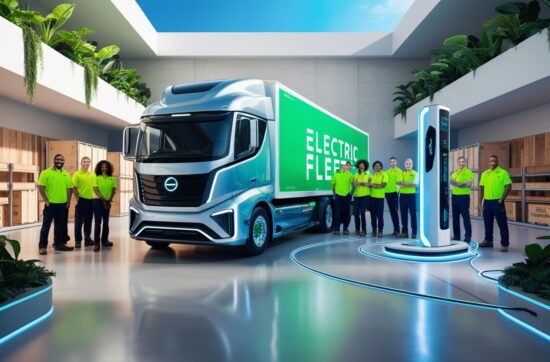Electric trucks are quickly becoming an important part of the logistics industry, playing a big role in efforts to be more sustainable. These vehicles use electric motors that create less pollution than traditional engines. This means this trucks can help reduce greenhouse gas emissions, which is crucial for promoting green logistics. Some key features of electric trucks are: The Rise of Electric Trucks The logistics industry is shifting towards using electric trucks more and more. This change is happening because of market trends and a growing focus on being eco-friendly. This trucks are now seen as an important way to cut costs, work better, and be kinder to the planet. Benefits of Electric Trucks This trucks have many advantages that make them a great choice for logistics companies: More and more people in logistics are learning about electric vehicles and agreeing that they’re a good idea. This suggests that in the future, being eco-friendly will also mean being successful in business. Environmental Impact Electric trucks play a crucial role in reducing greenhouse gas emissions in the logistics industry. When comparing emissions, it is evident that electric trucks produce significantly lower CO2 emissions than their diesel counterparts. This reduction directly contributes to sustainability goals set by governments and organizations worldwide. Benefits of Electric Trucks: Projections show that by 2035, electric trucks could capture up to 70% of the market share in logistics. This shift signifies a monumental change towards cleaner transportation solutions. The operational costs associated with electric trucks are lower due to reduced energy consumption and maintenance expenses. As technology advances, efficiency improves, making electric trucks an attractive option for logistics companies focused on sustainability and cost-effectiveness. Challenges Facing Electric Truck Adoption The transition to the trucks presents several challenges that need to be addressed for widespread adoption within the logistics sector. Understanding these barriers is crucial for stakeholders looking to integrate sustainable practices into their operations. High Initial Costs One of the most significant hurdles is the high initial costs associated with purchasing electric trucks. The price tag for electric vehicles (EVs) remains substantially higher than that of traditional diesel trucks. This financial barrier can deter companies, especially small to medium-sized enterprises, from making the switch. While lower operational costs over time can offset this initial investment, many businesses struggle with cash flow and budgeting constraints. Insufficient Charging Infrastructure Another major challenge is the insufficient charging infrastructure necessary for electric trucks. For successful integration into logistics operations, a robust network of charging stations must be established. Businesses need reliable access to charging stations to ensure efficiency and maintain commitment to timely deliveries. Without this infrastructure, companies may hesitate to invest in electric fleets. Government Support and Legislation Government initiatives play a critical role in facilitating the adoption of electric trucks. Tax incentives and supportive regulatory frameworks can help mitigate some challenges associated with high initial costs and infrastructure limitations. Countries like Norway have demonstrated success through aggressive policies that promote EV adoption, leading to a substantial increase in electric vehicle market share. By addressing…


